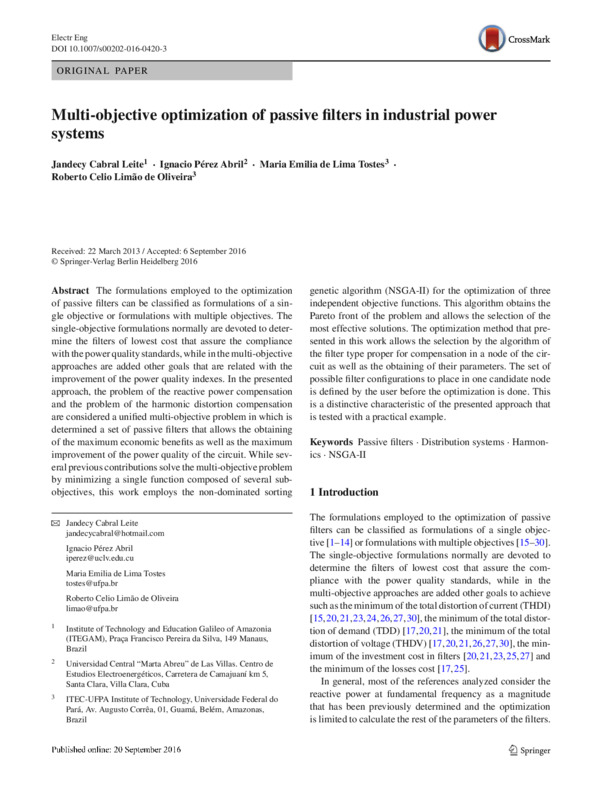Multi-objective optimization of passive filters in industrial power systems
Item
-
Tipo do ITEM
-
Artigo Ciêntifico
-
Título do Artigo
-
Multi-objective optimization of passive filters in industrial power systems
-
Descrição
-
ABSTRACT
The formulations employed to the optimization of passive filters can be classified as formulations of a single objective or formulations with multiple objectives. The single-objective formulations normally are devoted to determine the filters of lowest cost that assure the compliance with the power quality standards,while in themulti-objective approaches are added other goals that are related with the improvement of the power quality indexes. In the presented approach, the problem of the reactive power compensation and the problem of the harmonic distortion compensation are considered a unified multi-objective problem in which is determined a set of passive filters that allows the obtaining of the maximum economic benefits as well as the maximum improvement of the power quality of the circuit. While several previous contributions solve the multi-objective problem by minimizing a single function composed of several subobjectives, this work employs the non-dominated sorting genetic algorithm (NSGA-II) for the optimization of three independent objective functions. This algorithm obtains the Pareto front of the problem and allows the selection of the most effective solutions. The optimization method that presented in this work allows the selection by the algorithm of the filter type proper for compensation in a node of the circuit as well as the obtaining of their parameters. The set of possible filter configurations to place in one candidate node is defined by the user before the optimization is done. This is a distinctive characteristic of the presented approach that is tested with a practical example.
Keywords Passive filters · Distribution systems · Harmonics · NSGA-II
-
Abstract
-
ABSTRACT
The formulations employed to the optimization of passive filters can be classified as formulations of a single objective or formulations with multiple objectives. The single-objective formulations normally are devoted to determine the filters of lowest cost that assure the compliance with the power quality standards,while in themulti-objective approaches are added other goals that are related with the improvement of the power quality indexes. In the presented approach, the problem of the reactive power compensation and the problem of the harmonic distortion compensation are considered a unified multi-objective problem in which is determined a set of passive filters that allows the obtaining of the maximum economic benefits as well as the maximum improvement of the power quality of the circuit. While several previous contributions solve the multi-objective problem by minimizing a single function composed of several subobjectives, this work employs the non-dominated sorting genetic algorithm (NSGA-II) for the optimization of three independent objective functions. This algorithm obtains the Pareto front of the problem and allows the selection of the most effective solutions. The optimization method that presented in this work allows the selection by the algorithm of the filter type proper for compensation in a node of the circuit as well as the obtaining of their parameters. The set of possible filter configurations to place in one candidate node is defined by the user before the optimization is done. This is a distinctive characteristic of the presented approach that is tested with a practical example.
Keywords Passive filters · Distribution systems · Harmonics · NSGA-II
-
Língua do arquivo
-
inglês
-
Data da Publicação
-
Ano Desconhecido
-
Autores
-
Jandecy Cabral Leite
-
Ignacio Pérez Abril
-
Maria Emilia de Lima Tostes
-
Roberto Celio Limão de Oliveira
-
Local
-
UFPA - Alemanha, 2016


